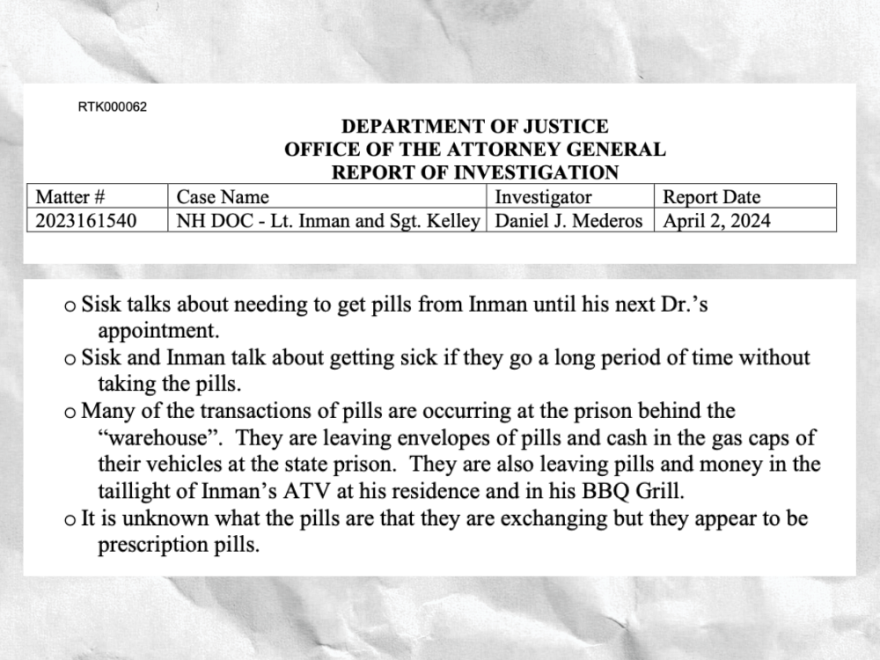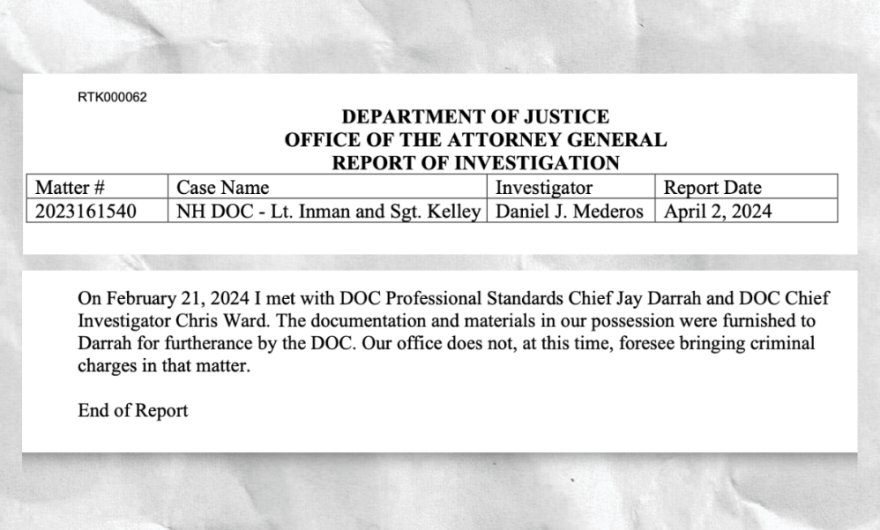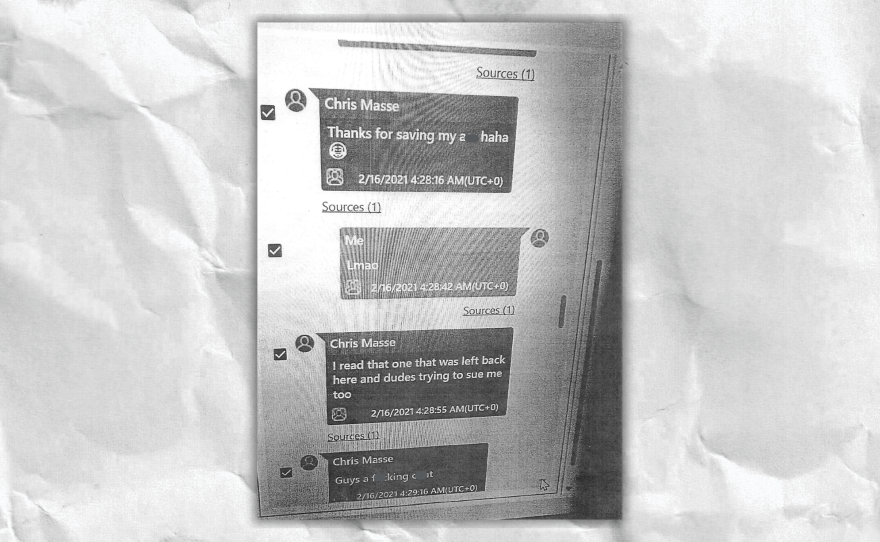New Hampshire corrections officer Sgt. Christopher Masse was in a jam. He’d somehow learned that one of the inmates in his care at the New Hampshire State Prison for Men was planning to file a complaint about him.
On Feb. 15, 2021, while working third shift, Masse texted his colleague Sgt. Thomas Kelley.
“Holy f*** dude this legal mail and rat notes are out of f***ing hand,” Masse wrote.
But apparently, Kelley had already heard this person was filing a complaint, and Kelley had decided to take matters into his own hands.
“Dude it’s bad,” Kelley texted back. “I took a ton home with me that probably contain your name.”
Kelley stole six pieces of mail in an apparent bid to intercept inmates’ complaints from reaching their intended destination. He sent a photo to Masse to prove it. In the photo, six envelopes are fanned out, and the one on top appears to be sent by an inmate to Merrimack County Superior Court.
“Thanks for saving my ass haha,” Masse texted Kelley. Later, Masse added, “ur the true hero tonight.”
This text conversation is just one of several message exchanges that point to potential crimes involving corrections officers at the New Hampshire State Prison for Men, which multiple state and federal agencies investigated in 2023 but then declined to prosecute, according to documents obtained by NHPR from the New Hampshire Department of Justice.
Authorities also uncovered evidence of illegal drug use and potential drug trafficking by corrections officers, a plan to falsify records to cover up potential physical abuse of an inmate, and plans to retaliate against at least one inmate for making complaints, documents show.
None of these details would have come to light if not for a major investigation by New Hampshire Fish and Game known as “Operation Night Cat,” which revealed one of the largest poaching cases in recent state history. Five men were convicted on a range of hunting-related crimes; four of those men – including Kelley, as well as Lt. Randy Inman, Sgt. Gerald Williams, and Sgt. Sherwood Dubrey – were current or former state corrections officers.
Documents obtained by NHPR show search warrants executed by Fish and Game officers regarding potential hunting crimes also uncovered text conversations between corrections officers that took questionable, and in some cases violent, turns. After viewing multiple examples of messages that suggested mistreatment of inmates at the men’s prison, Fish and Game officers alerted the New Hampshire Attorney General’s office in March 2023.
More than two years later, records show investigators with multiple law enforcement agencies – including the New Hampshire Department of Justice, the U.S. Attorney’s office, the FBI, and the U.S. Postal Service – have all dug into these findings.
But no criminal charges have been filed.
“While some findings from our review were concerning, accountability to date has been administrative rather than criminal, with the New Hampshire Department of Corrections implementing corrective disciplinary and personnel measures,” Michael Garrity, spokesperson for the state Department of Justice, said in a statement. “The NH DOJ will consider further action should new information arise.”
These text messages also offer a window into New Hampshire’s struggling men’s prison, which has been plagued in recent years by cost overruns, chronic staffing shortages leading many corrections officers to work long overtime hours, and aging infrastructure in need of significant facility and security upgrades.
Two legal experts who reviewed the documents obtained by NHPR called the evidence “disturbing.”
“I would be shocked if anyone looked at what I’m looking at and drew the conclusion that we’re getting the best and brightest – or even close to it,” said Michael Lewis, a former New Hampshire state prosecutor.
“This is very credible evidence of alarming behavior at a minimum and potentially criminal behavior at the other end of the extreme,” said Julian Jefferson, a former New Hampshire public defender who teaches at the UNH School of Law.
Stolen legal mail
By 2021, Shawn Cochrane had been in and out of the New Hampshire State Prison for Men for nearly two decades, mostly due to theft and forgery convictions and parole violations. Early 2021 was by far his worst experience in the prison, he said in an interview.
Cochrane was in the Special Housing Unit, or SHU, which requires the highest level of inmate supervision. Cochrane had been held there before and he told NHPR he and other inmates were constantly harassed by some of the younger, less experienced corrections officers in his unit, especially Kelley.

Cochrane’s complaints range from physical abuse (officers once “stomped me out,” he said) to humiliation by officers. In the interview, Cochrane alleged officers kept him in a separate room at the prison, and left him there, naked, for three days. As for Kelley, Cochrane said, he would “purposely go out of [his] way to try to make your life miserable.”
“He'll throw you food through the slot or he'll just leave it on the slot long enough so it falls out of your tray, out of the cell, and then just not give you any more food,” Cochrane said.
Cochrane remembers mailing a complaint to the Merrimack County Superior Court, and said the retaliation from corrections officers was almost immediate. One night, Cochrane said, officers “ripped” his cell apart, and took notes Cochrane had been keeping about his experience in prison.
“You just don't have any recourse,” Cochrane said.
Cochrane’s recollection lines up with the February 2021 text conversation between Kelley and Masse. After Kelley texted Masse a photo of the letters Kelley took home with him, Masse texted, “[Think] we’re gunna have to search some cells tomorrow.”
“Yup!” Kelley replied.
“Let’s do it me n u,” Masse texted back, adding later, “we really got to intercept this c***s s*** bad ! Gotta have the boys tear that room up,” likely referring to other corrections officers.
Documents from the state Department of Corrections show Kelley and another corrections officer reported a search of Cochrane’s cell on Feb. 17, 2021, two days after Kelley’s text conversation with Masse. The log states Kelley indicated he took “trash” out of Cochrane’s room.
"we really got to intercept this c***s s*** bad ! Gotta have the boys tear that room up"Then-Sgt. Christopher Masse to then-Sgt. Thomas Kelley, in a February 2021 text conversation
Disputes between inmates and corrections officers are common. It’s also normal, and legal, for corrections officers to view incoming and outgoing mail to prevent contraband like drugs, for example, from getting inside the prison. But there are two major exceptions to this: legal mail – that is, letters between inmates and their lawyers – and what’s known as “privileged correspondence.”
According to the New Hampshire Department of Corrections’ administrative rules, "privileged" mail includes letters from an inmate to public figures like the president, governor, attorney general, or any letters to and from a state or federal court. These letters are generally off limits to corrections officers. “Outgoing privileged mail,” the rules state, “shall be handled without interference, inspection, reading, or opening.” Stealing any kind of mail is also a federal crime.
State documents suggest Cochrane’s letters never made it to their intended destination.
In May 2023, two years after the mail incident, Kelley was fired by the state Department of Corrections. In a letter of dismissal, Warden Michelle Edmark wrote that Kelley told her he accidentally took the mail and returned it to the prison the following day. However, “there is no record to show that privileged mail went out for this resident as you report bringing it back the next day,” Edmark wrote to Kelley.
Both the U.S. Postal Inspection Service and the FBI reviewed this text message exchange, documents show. However, representatives from both agencies told state investigators in January 2024 that the U.S. Attorney’s office would not charge Kelley with mail theft.
In documents detailing the state’s internal investigation into Kelley’s behavior, corrections staff reported Kelley had “stolen and viewed privileged correspondence” of an inmate in his care, was “untruthful and deceptive,” and broke multiple statutes and rules, which all contributed to his termination.
Kelley, corrections staff said, “had repeatedly demonstrated that he did not possess the honesty and integrity required of a sworn certified corrections officer.”
Kelley referred NHPR’s requests for comment to his attorney, Mark Sisti, who questioned Cochrane’s credibility and said the matter was “fully investigated by the Department of Corrections” and no criminal charges were filed. Sisti also noted Kelley is appealing his termination.
The Department of Corrections placed Masse on non-disciplinary suspension during the investigation. After receiving a disciplinary demotion in July 2024, Masse is back on the job.
Masse also did not respond to multiple requests for comment.
This reporting was produced by NHPR’s Document team. This longform narrative reporting initiative is driven by the idea that taking the time to tell the whole story leads to bigger impact – opened minds, changed policies – and a more nuanced understanding of the people at the heart of important issues affecting many of us every day. Learn more about Document's work here.
Potential drug crimes
New Hampshire Fish and Game’s poaching investigation also uncovered evidence that some state corrections officers were involved in potential drug crimes.
When Fish and Game officers arrived with a search warrant at corrections officer Lt. Randy Inman’s home, they were surprised to find not just evidence of potential hunting crimes, but “suspected illegal drugs,” drug paraphernalia, and evidence of drug sales, documents show. Inman told officers some of it belonged to him, but that a psychedelic mushroom grow kit belonged to his stepson.
State documents show investigators with the state Attorney General’s office also reviewed "potential incriminating communications” from Inman. In a 2024 summary report, a state investigator wrote that text messages from 2022 and 2023 between Inman and his then-girlfriend suggest Inman acted as a middleman for drug purchases between his stepson and the girlfriend.
Don't miss another important local story. Sign up for our free newsletter.
Additional text conversations reviewed by the state Attorney General’s office show Inman was also exchanging pills for cash in the parking lot of the men’s prison. In text conversations between 2021 and 2023, Inman and another corrections officer, David Sisk, discuss leaving envelopes of pills and cash in the gas caps of their vehicles at the prison.
“Sisk and Inman talk about getting sick if they go a long period of time without taking the pills,” a state investigator wrote in his report. “They are also leaving pills and money in the taillight of Inman’s ATV at his residence and in his BBQ Grill.”
It appears Inman and Sisk will not face any criminal charges for these alleged incidents.
Federal authorities obtained a search warrant to review data from Inman’s cell phone in November 2023, documents show. But less than two months later, they told state investigators that based on their review, the U.S. Attorney’s office would only move forward on charges related to the poaching investigation and a potential illegal weapons charge. No federal charges have been filed against Inman.
Inman retired from the Department of Corrections in May 2023. He did not respond to multiple requests for comment.
In an email, Sisk told NHPR that the allegations were false.
“After a year plus long investigation including drug tests I was cleared and put back on full duty,” he said. “This incident turned my life upside down but my name has been cleared.”
In an email, a spokesperson for the Department of Corrections told NHPR that Sisk is no longer employed at the prison as of February 2025. The spokesperson said the department could not comment on whether Sisk was subject to drug tests.

‘Just don’t forget who loves you’
Investigators also viewed many examples of text messages that show a workplace culture where dark jokes among corrections staff appear to be common.
In 2017, in text messages reviewed by NHPR, Kelley and another corrections officer appeared to celebrate the violent and controversial death of a man incarcerated in the prison’s Secure Psychiatric Unit or SPU. Kelley called the man a “dummy.”
“Please shoot him,” Kelley texted Masse about another inmate who had allegedly attempted to escape the prison in September of 2019.
“Please shoot him”Text from then-Sgt. Thomas Kelley to then-Sgt. Christopher Masse, referencing about an inmate who had allegedly attempted to escape the prison in September 2019
“I want to feel his skull cave in with my fists,” Masse wrote back. Kelley responded, “lmao,” the abbreviation for “laughing my ass off.”
Other text conversations reviewed by NHPR suggest Inman helped Kelley cover up an injury he sustained during a February 2019 physical altercation with a man held in the Secure Housing Unit named Devin Tappan.
On Feb. 25, 2019, Kelley received a text from a colleague asking, “You guys mash Tappan?”
“F*** yes,” Kelley wrote back.
The next morning, Kelley appears to celebrate his role in the altercation with Tappan, asking his colleague to describe the shape Tappan was in.
“Hows he look,” Kelley wrote. According to his colleague, Tappan had an injured face, a black eye, and refused to eat.
“So I did ok lol,” Kelley texted back. Kelley then mentioned a possible hand injury from the incident. “My fist is killing me lol,” Kelley wrote.
Two weeks later, in March 2019, it appears Kelley’s fist was still bothering him, and he planned to do something about it. Kelley texted Inman that his hand was “still f***ed up” and he needed to tell other corrections staff so he could get it checked out.
Then, Kelley asked Inman for help.
“You still on board saying you stepped on my hand?” Kelley asked Inman.
“Yes, because I did,” Inman wrote back.
“Exactly. Thank you,” Kelley said.
Inman sent Kelley a photo of a witness statement he turned in to corrections staff, where he describes a “cell extraction” of Tappan. In this form, Inman reported to higher ups that Tappan “charged” at Inman, “swinging his arms at me,” and that Inman struggled to handcuff Tappan. “It was during this time that I unknowingly stepped on corporal Kelley, Thomas’ hand. I instantly felt his hand move under my boot and I quickly moved my foot.”
After apparently viewing this document, Kelley texted back, “Awesome, thank you so much.” He later added that he planned to submit his own witness statement soon and would “make sure they match.”
“Just don’t forget who loves you,” Inman texted Kelley.
Tappan attempted to sue Kelley in 2022. In court documents, he alleged that Kelley and a crew of guards threw him to the floor, held his hands behind his back, and then punched, kicked, and tasered him. He told the court that it left him with bruises, minor cuts, an injured neck, and an extremely swollen face. That lawsuit was dismissed earlier this year because he didn't file suit within the statute of limitations.
Investigators with the New Hampshire Department of Justice’s Public Integrity Unit reviewed the text exchanges about the Tappan incident and others recovered from Kelley and Inman’s cell phones. However, the Justice Department ultimately decided to suspend its criminal investigation in June 2024 and hand over the evidence to the Department of Corrections for an internal, administrative investigation, documents show.
A Department of Corrections spokesperson declined to comment on the details of its internal investigation and the conduct of its officers, but said that documents obtained by NHPR “represent a limited snapshot in time and may not capture the full context or scope of relevant events.”
Sisti, Kelley’s attorney, said Kelley “had nothing to do with any abuse with regard to that inmate.”

‘Alarming’ evidence
Former state prosecutor Michael Lewis and Julian Jefferson, a former New Hampshire public defender, reviewed the text exchanges and other documents obtained by NHPR. Jefferson called them “alarming” and “concerning,” but he and Lewis also noted this evidence alone does not show proof beyond a reasonable doubt that these corrections officers committed crimes.
“The whole point of the Public Integrity Unit is to take investigations further and find facts if they believe there's obvious gaps.”Julian Jefferson, a former New Hampshire public defender who teaches at the UNH School of Law
Based on the documents he reviewed, Jefferson said investigators could have gone deeper, pointing specifically to the alleged assault of an inmate by Kelley.
“Are there videotapes of this extraction? Did anybody have a body-worn camera video on them? Every single person who was involved in that extraction should be interviewed…,” he said. “The whole point of the Public Integrity Unit is to take investigations further and find facts if they believe there's obvious gaps.”
A New Hampshire Department of Justice investigation summary report does not show officials conducted interviews or reviewed security footage of the incident before suspending their investigation.
Spokespeople for the state Department of Justice and U.S. Attorney’s office declined to comment on their decisions not to file criminal charges.
Jefferson noted state and federal prosecutors, which often have limited resources or other priorities, have full discretion to decide which cases to pursue. Considering many of these corrections officers were fired or retired while under investigation, the case may not have risen to a high level of importance.
“I think it’s well within… prosecutorial discretion to say, ‘These are bad actors. If you fired them, then that can be enough,’” Jefferson said.
Lewis said bringing cases against corrections officers could also become a legal liability for the state.
“Opening the door to what’s happening could reflect very, very badly on the state and expose the state and its officials… to negative legal consequences,” said Lewis.
Lewis said the U.S. Attorney’s office could have investigated the situation at the New Hampshire Department of Corrections as an independent, third party.
Lewis pointed to an October 2023 letter sent by Dan Jimenez, chief of the state’s Public Integrity Unit, to then-U.S. Attorney Jane Young. In it, Jimenez wrote that the state had “stayed” its investigation into these potential crimes after helping federal investigators “obtain the necessary materials” to conduct their own.
“It's a worthy question to ask… Why didn't the U.S. Attorney's office bring a case here?”Michael Lewis, a former New Hampshire state prosecutor
“I write to notify you that [it] appears that the federal investigation has since stalled and any potential state level crimes are becoming stale,” Jimenez wrote, later adding, “As you know… as each day goes by, any state investigation and potential prosecution becomes staler and weaker.”
The following May 2024, Jimenez sent a letter to the state’s then-corrections commissioner, informing her the Public Integrity Unit had determined it did not have enough evidence to prove these potential crimes “beyond a reasonable doubt.”
Lewis questions what happened in the months between these two letters.
“It's a worthy question to ask… why? Why didn't the U.S. Attorney's office bring a case here?” Lewis said.
NHPR’s Jason Moon contributed reporting.
Investigations like this are powered by readers like you.
Investigative reporting is time-consuming. It’s expensive. And it’s a team sport.
Operation Night Cat took a whole year to report and a lot of behind-the-scenes work to deliver. Beyond pay for the reporters and editors on this story...
- • We sued the state for access to public documents.
- • Our reporters drove roughly 1,750 miles around New Hampshire to interview sources and get documents.
- • We paid fees to access court records.
- • We hired a fact-checker to confirm every detail in this story.
That’s what it takes to produce fact-based, verifiable local news that serves the public good. And it only happens when people like you choose to invest in it.
Thank you for considering a donation to NHPR in any amount. Your support helps us ask tough questions and keep our community informed.

Sincerely,
Taylor Quimby
Executive Producer, Outside/In




















